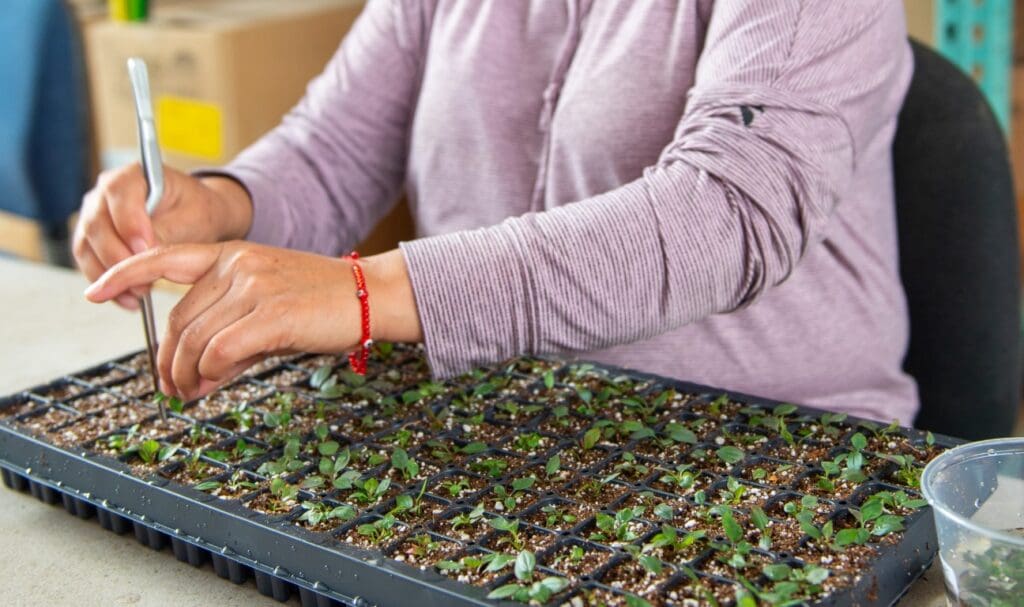PULLMAN, Wash.
March 30, 2022 – Horticultural biotechnology company NuPhY, Inc. announced that it was awarded a competitive WSDA Nursery Research Grant to develop controlled environment production of pathogen free, true-to-type rootstocks, easing the bottleneck of rootstock acquisition and providing for growers in an uncertain climatic future.
Climate pressures and pathogen stress are contributing to growers’ urgent need of clean, true-to-type rootstocks. “Growers are seeing more destructive weather patterns,” explains Dr. Seanna Hewitt, a scientist at NuPhY. “Cold snaps, drought stress, and heat waves all contribute to the stress of the plant and make them more susceptible to disease.” In addition, over 100 viral pathogens are known to infect fruit trees in the Pacific Northwest, including Little Cherry Disease which is estimated to cost growers $115 million to replant orchards lost in the last 5 years alone. Dr. Hewitt continues, “None of these viral diseases can be cured. Growers are faced with removing the trees, fumigating the land, and then replanting.”
Dr. Hewitt clarified the situation further: “Climate pressure makes plants more susceptible to viral disease, and viral infection makes the plant more vulnerable to both climate extremes and other viruses. It’s a cyclical problem, and farmers have to mitigate the factors that they have control over.” Without the ability to change the weather, farmers are left with doing what they can to eliminate disease; but clean material for replanting can be hard to find. “At NuPhY, all of our material is clean. Most of our process is already strictly controlled, so we wanted to expand that platform to include rootstock finishing,” says Dr. Amit Dhingra, CSO of NuPhY and Head of the Department of Horticultural Sciences at Texas A&M University. “The final plant is virus free and has been protected from environmental pests, and it grows vigorously when it reaches the field.”
The grant focuses on two phases of plant growth: the MultiPHY™ plant propagation process, and the VertiPHY™ plant finishing platform. The MultiPHY™ process rapidly produces tens of thousands of plants per week using shoot micropropagation. These plants are screened for viruses and microbes before multiplication, and they are propagated in clean conditions that prevent infection. Plants are then acclimatized to environmental conditions in preparation for greenhouse growth, but most greenhouses are still open to the environment. VertiPHY™ replaces the greenhouse stage of rootstock finishing, and using carefully controlled conditions, provides the perfect environment for plants to grow to specification and prepare for field growth. The two processes together reduce the time it takes to grow a rootstock to budding by 30% compared to conventional practices, and the mortality rate of the finished rootstock is below 1%.
“Starting with clean material is vital to mitigate disease,” says Dr. Dhingra, “An orchard can’t meet its full potential if it starts off infected.” And CEO Mike Werner echoed the sentiment: “Access to virus-free rootstocks means that growers are able to keep up with climate and pathogen pressures. When those rootstocks are healthy and vigorous, it also means that farmers are faster to ROI and their businesses are more sustainable.”
NuPhY Inc.
NuPhY, a spinout from Amit Dhingra’s research program at Washington State University, is a privately held agricultural biotechnology company based in Pullman, Washington. It uses proprietary processes that grow true-to-type disease-free horticultural crops. NuPhY’s proprietary MultiPHY process delivers superior quality plants that can reduce the time to fruiting and minimize input costs. In addition, NuPhY also operates a full-service Genetics Testing and Analysis lab that uses robotic technology to screen for over 2400 different viruses and various other pathogens. NuPhY’s lab is listed by the Clean Plant Center Northwest as capable of testing for Little Cherry Virus 2 and X-Disease. NuPhY also supports a plant repository program that helps growers and plant breeders store and secure plant material for future propagation and analysis.


